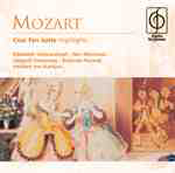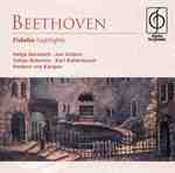
19 Jun 2008
Karajan opera highlights on Classics for Pleasure
The opera highlights series from Classics for Pleasure continues its recycling of the EMI catalogue with selections from two of Herbert von Karajan's recordings.
The Sixteen continues its exploration of Henry Purcell’s Welcome Songs for Charles II. As with Robert King’s pioneering Purcell series begun over thirty years ago for Hyperion, Harry Christophers is recording two Welcome Songs per disc.
In February this year, Albanian soprano Ermonela Jaho made a highly lauded debut recital at Wigmore Hall - a concert which both celebrated Opera Rara’s 50th anniversary and honoured the career of the Italian soprano Rosina Storchio (1872-1945), the star of verismo who created the title roles in Leoncavallo’s La bohème and Zazà, Mascagni’s Lodoletta and Puccini’s Madama Butterfly.
Collapsology. Or, perhaps we should use the French word ‘Collapsologie’ because this is a transdisciplinary idea pretty much advocated by a series of French theorists - and apparently, mostly French theorists. It in essence focuses on the imminent collapse of modern society and all its layers - a series of escalating crises on a global scale: environmental, economic, geopolitical, governmental; the list is extensive.
Amongst an avalanche of new Mahler recordings appearing at the moment (Das Lied von der Erde seems to be the most favoured, with three) this 1991 Mahler Second from the 2nd Kassel MahlerFest is one of the more interesting releases.
If there is one myth, it seems believed by some people today, that probably needs shattering it is that post-war recordings or performances of Wagner operas were always of exceptional quality. This 1949 Hamburg Tristan und Isolde is one of those recordings - though quite who is to blame for its many problems takes quite some unearthing.
The voices of six women composers are celebrated by baritone Jeremy Huw Williams and soprano Yunah Lee on this characteristically ambitious and valuable release by Lontano Records Ltd (Lorelt).
As Paul Spicer, conductor of the Royal Birmingham Conservatoire Chamber Choir, observes, the worship of the Blessed Virgin Mary is as ‘old as Christianity itself’, and programmes devoted to settings of texts which venerate the Virgin Mary are commonplace.
Ethel Smyth’s last large-scale work, written in 1930 by the then 72-year-old composer who was increasingly afflicted and depressed by her worsening deafness, was The Prison – a ‘symphony’ for soprano and bass-baritone soloists, chorus and orchestra.
‘Hamilton Harty is Irish to the core, but he is not a musical nationalist.’
‘After silence, that which comes closest to expressing the inexpressible is music.’ Aldous Huxley’s words have inspired VOCES8’s new disc, After Silence, a ‘double album in four chapters’ which marks the ensemble’s 15th anniversary.
A song-cycle is a narrative, a journey, not necessarily literal or linear, but one which carries performer and listener through time and across an emotional terrain. Through complement and contrast, poetry and music crystallise diverse sentiments and somehow cohere variability into an aesthetic unity.
One of the nicest things about being lucky enough to enjoy opera, music and theatre, week in week out, in London’s fringe theatres, music conservatoires, and international concert halls and opera houses, is the opportunity to encounter striking performances by young talented musicians and then watch with pleasure as they fulfil those sparks of promise.
“It’s forbidden, and where’s the art in that?”
Dublin-born John F. Larchet (1884-1967) might well be described as the father of post-Independence Irish music, given the immense influenced that he had upon Irish musical life during the first half of the 20th century - as a composer, musician, administrator and teacher.
The English Civil War is raging. The daughter of a Puritan aristocrat has fallen in love with the son of a Royalist supporter of the House of Stuart. Will love triumph over political expediency and religious dogma?
Beethoven Symphony no 9 (the Choral Symphony) in D minor, Op. 125, and the Choral Fantasy in C minor, Op. 80 with soloist Kristian Bezuidenhout, Pablo Heras-Casado conducting the Freiburger Barockorchester, new from Harmonia Mundi.
A Louise Brooks look-a-like, in bobbed black wig and floor-sweeping leather trench-coat, cheeks purple-rouged and eyes shadowed in black, Barbara Hannigan issues taut gestures which elicit fire-cracker punch from the Mahler Chamber Orchestra.
‘Signor Piatti in a fantasia on themes from Beatrice di Tenda had also his triumph. Difficulties, declared to be insuperable, were vanquished by him with consummate skill and precision. He certainly is amazing, his tone magnificent, and his style excellent. His resources appear to be inexhaustible; and altogether for variety, it is the greatest specimen of violoncello playing that has been heard in this country.’
Baritone Roderick Williams seems to have been a pretty constant ‘companion’, on my laptop screen and through my stereo speakers, during the past few ‘lock-down’ months.
Melodramas can be a difficult genre for composers. Before Richard Strauss’s Enoch Arden the concept of the melodrama was its compact size – Weber’s Wolf’s Glen scene in Der Freischütz, Georg Benda’s Ariadne auf Naxos and Medea or even Leonore’s grave scene in Beethoven’s Fidelio.

The opera highlights series from Classics for Pleasure continues its recycling of the EMI catalogue with selections from two of Herbert von Karajan's recordings.
The Cosi fan Tutte is the well-regarded 1954 set, in dry, flat mono. In its 72 minutes, the highlights favor act one and the first two scenes of act two. Most of the opera's most beloved music does come in these sections, but any sense of the dramatic resolution gets lost in the quick jump to the supposedly joyous final ensemble.
Is it just the faded quality of the mono sound that makes it difficult for your reviewer to find the sparkle and charm that the performance promises? Elisabeth Schwarzkopf sings with style and accuracy, but little warmth. Nan Merriman's Dorabella makes the most of her act one solo, "Smanie implacabili," infusing her reading with an edge of anger reminiscent of Donna Elvira. After that, she slips into the ensembles and loses any profile. Rolando Panerai and Leopold Simoneau, as the two lover/soldiers, sound appropriately fresh. Not much of Sesto Bruscantini's Don Alfonso can be heard, which may explain the lack of dramatic impetus. Ultimately, Karajan seems to have gotten the note-perfect performance he wanted, but the lack of edge tends to make the numbers run together.
 The 1971 Fidelio finds Karajan urging on the drama. The strings cut through impatiently, horns ring out with emphatic despair. But every moment seems to come in its own little interpretive capsule, unconnected to the next. Jon Vickers, who had already offered a remarkable Florestan on the famed Klemperer set, may be acting when he lets his voice sound worn at times, or it may be the singer coping with Karajan's sometimes languid tempo. Helga Dernesch faces a similar challenge in the rhythmically fragmented "Abscheulicher!" solo. She relies more on lungpower than interpretation, but that also has its merits. The rest of the cast makes little impression, although Karl Ridderbusch makes Rocco less annoying than the character can be.
The 1971 Fidelio finds Karajan urging on the drama. The strings cut through impatiently, horns ring out with emphatic despair. But every moment seems to come in its own little interpretive capsule, unconnected to the next. Jon Vickers, who had already offered a remarkable Florestan on the famed Klemperer set, may be acting when he lets his voice sound worn at times, or it may be the singer coping with Karajan's sometimes languid tempo. Helga Dernesch faces a similar challenge in the rhythmically fragmented "Abscheulicher!" solo. She relies more on lungpower than interpretation, but that also has its merits. The rest of the cast makes little impression, although Karl Ridderbusch makes Rocco less annoying than the character can be.
At an hour of music without dialogue, a Fidelio highlights set may be the way to go for some listeners, as it contains much of the opera's best music. Both this Fidelio and the Cosi certainly deserve acknowledgement as offering expert performances in many regards, but with strong competition from other sets for both operas, these two highlights CDs can best be recommended to die-hard fans of HvK.
Chris Mullins